University Nursing Care Essay: Medication Errors in Cardiology Wards
VerifiedAdded on 2022/10/03
|6
|1489
|398
Essay
AI Summary
This essay critically analyzes the issue of medication errors within a cardiology ward, focusing on the safety of patients and the responsibilities of nurses. It delves into the prevalence of medication errors, their causes, and the impact on patient care, including incorrect dosing, administering the wrong medications, and failures in providing necessary treatments. The essay highlights the role of nurses in managing patients with cardiovascular diseases, emphasizing the importance of monitoring, follow-up care, and adherence to the NMBA Code of Conduct. It discusses how factors such as stress and long shift timings can contribute to medication errors and violate the code, leading to potential harm for patients. The analysis includes recommendations for reducing errors, such as increasing nursing staff, improving staff knowledge, and encouraging error reporting. The essay concludes by emphasizing the need for nurses to be vigilant, understand medication details, and prioritize patient safety to minimize risks and legal repercussions. The essay references several studies and guidelines to support its arguments, providing a comprehensive overview of the issue.
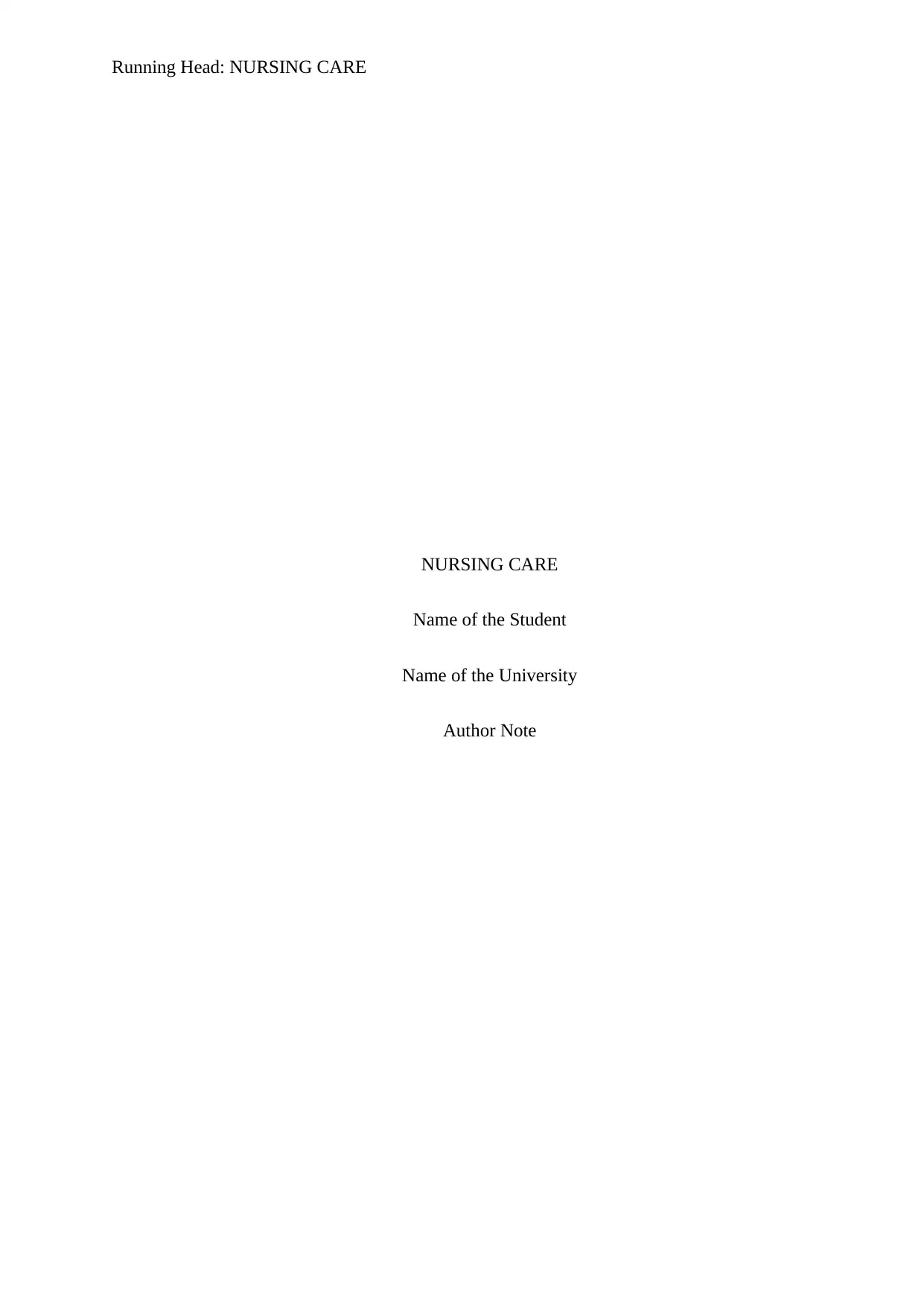
Running Head: NURSING CARE
NURSING CARE
Name of the Student
Name of the University
Author Note
NURSING CARE
Name of the Student
Name of the University
Author Note
Paraphrase This Document
Need a fresh take? Get an instant paraphrase of this document with our AI Paraphraser
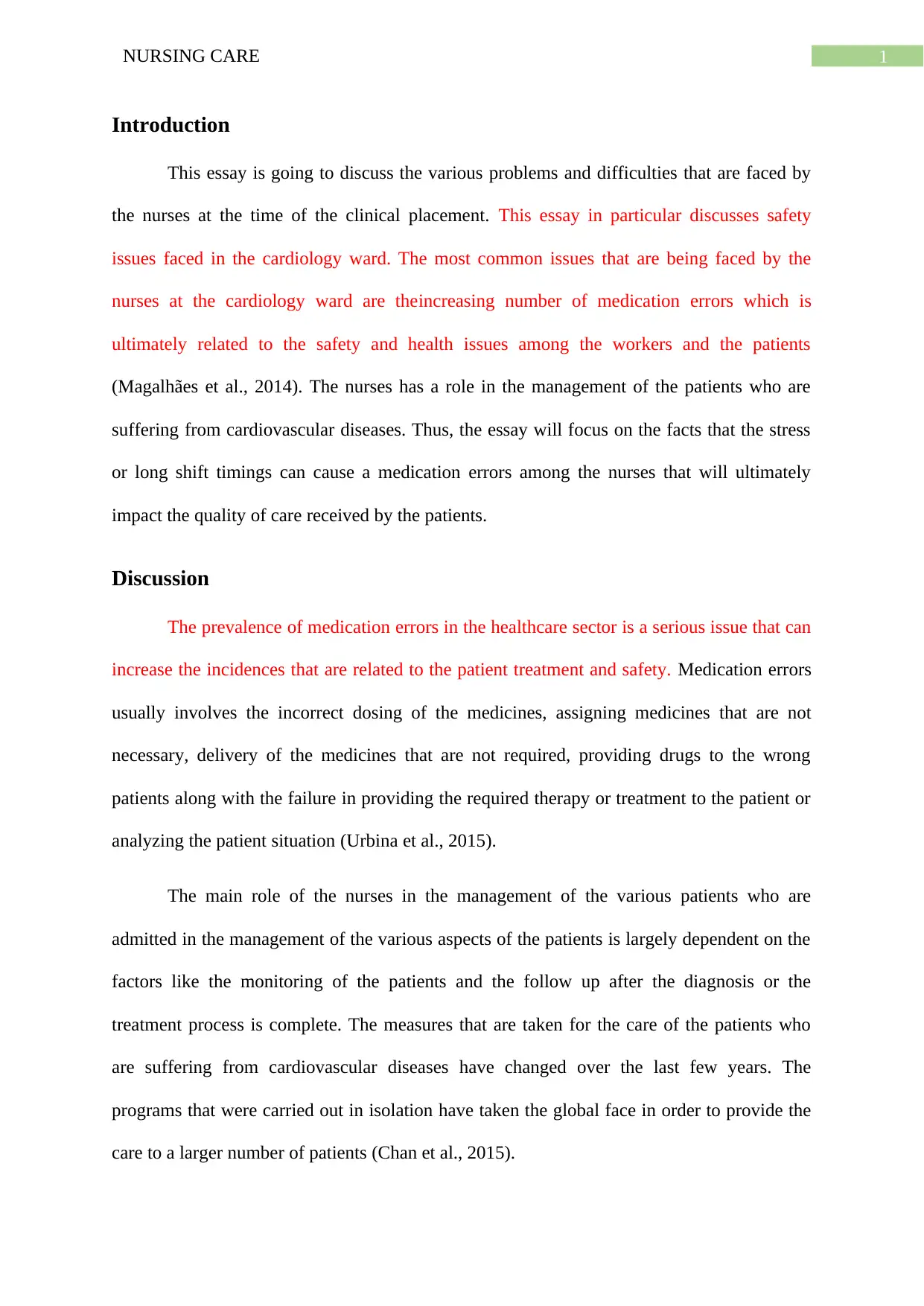
1NURSING CARE
Introduction
This essay is going to discuss the various problems and difficulties that are faced by
the nurses at the time of the clinical placement. This essay in particular discusses safety
issues faced in the cardiology ward. The most common issues that are being faced by the
nurses at the cardiology ward are theincreasing number of medication errors which is
ultimately related to the safety and health issues among the workers and the patients
(Magalhães et al., 2014). The nurses has a role in the management of the patients who are
suffering from cardiovascular diseases. Thus, the essay will focus on the facts that the stress
or long shift timings can cause a medication errors among the nurses that will ultimately
impact the quality of care received by the patients.
Discussion
The prevalence of medication errors in the healthcare sector is a serious issue that can
increase the incidences that are related to the patient treatment and safety. Medication errors
usually involves the incorrect dosing of the medicines, assigning medicines that are not
necessary, delivery of the medicines that are not required, providing drugs to the wrong
patients along with the failure in providing the required therapy or treatment to the patient or
analyzing the patient situation (Urbina et al., 2015).
The main role of the nurses in the management of the various patients who are
admitted in the management of the various aspects of the patients is largely dependent on the
factors like the monitoring of the patients and the follow up after the diagnosis or the
treatment process is complete. The measures that are taken for the care of the patients who
are suffering from cardiovascular diseases have changed over the last few years. The
programs that were carried out in isolation have taken the global face in order to provide the
care to a larger number of patients (Chan et al., 2015).
Introduction
This essay is going to discuss the various problems and difficulties that are faced by
the nurses at the time of the clinical placement. This essay in particular discusses safety
issues faced in the cardiology ward. The most common issues that are being faced by the
nurses at the cardiology ward are theincreasing number of medication errors which is
ultimately related to the safety and health issues among the workers and the patients
(Magalhães et al., 2014). The nurses has a role in the management of the patients who are
suffering from cardiovascular diseases. Thus, the essay will focus on the facts that the stress
or long shift timings can cause a medication errors among the nurses that will ultimately
impact the quality of care received by the patients.
Discussion
The prevalence of medication errors in the healthcare sector is a serious issue that can
increase the incidences that are related to the patient treatment and safety. Medication errors
usually involves the incorrect dosing of the medicines, assigning medicines that are not
necessary, delivery of the medicines that are not required, providing drugs to the wrong
patients along with the failure in providing the required therapy or treatment to the patient or
analyzing the patient situation (Urbina et al., 2015).
The main role of the nurses in the management of the various patients who are
admitted in the management of the various aspects of the patients is largely dependent on the
factors like the monitoring of the patients and the follow up after the diagnosis or the
treatment process is complete. The measures that are taken for the care of the patients who
are suffering from cardiovascular diseases have changed over the last few years. The
programs that were carried out in isolation have taken the global face in order to provide the
care to a larger number of patients (Chan et al., 2015).
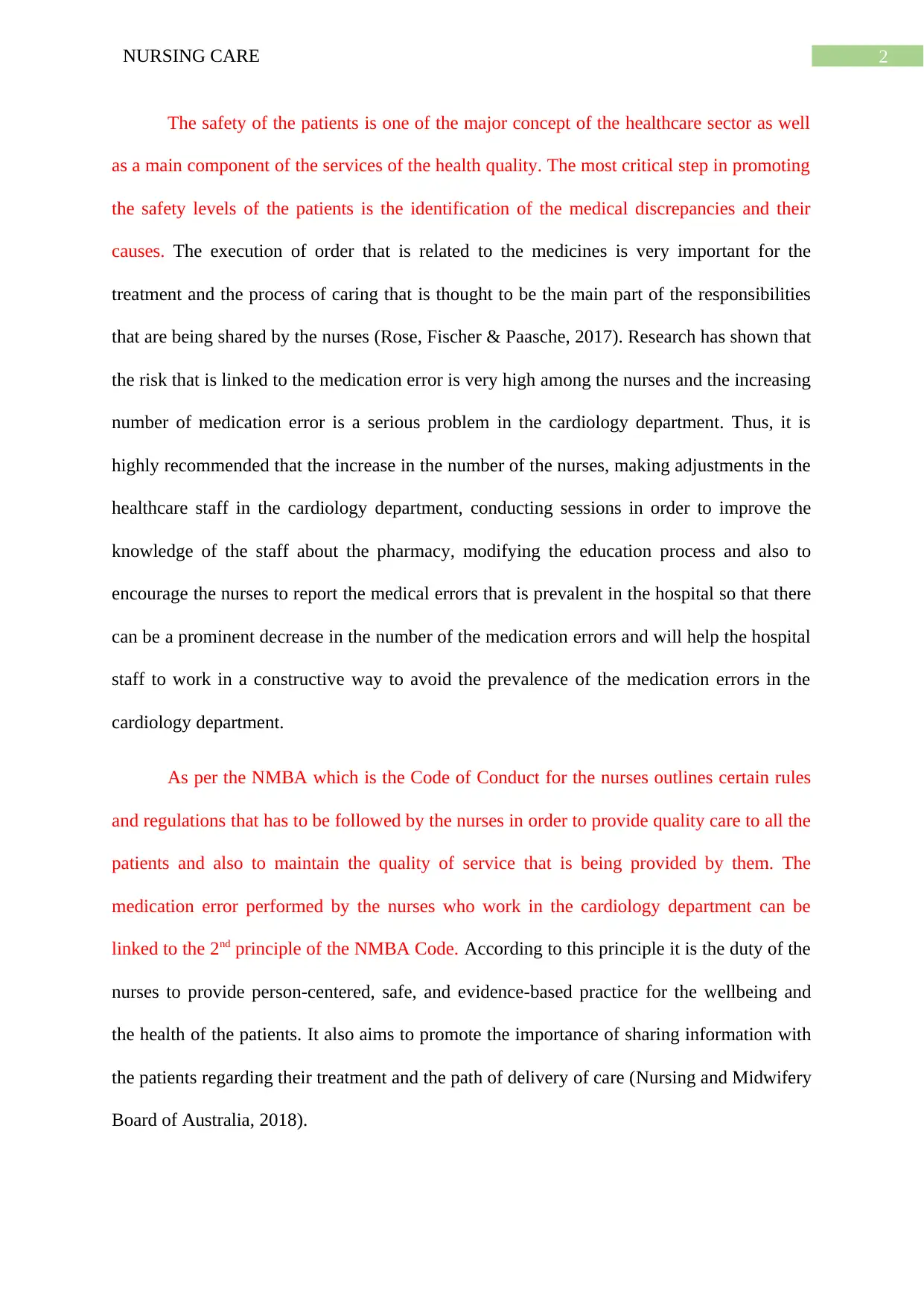
2NURSING CARE
The safety of the patients is one of the major concept of the healthcare sector as well
as a main component of the services of the health quality. The most critical step in promoting
the safety levels of the patients is the identification of the medical discrepancies and their
causes. The execution of order that is related to the medicines is very important for the
treatment and the process of caring that is thought to be the main part of the responsibilities
that are being shared by the nurses (Rose, Fischer & Paasche, 2017). Research has shown that
the risk that is linked to the medication error is very high among the nurses and the increasing
number of medication error is a serious problem in the cardiology department. Thus, it is
highly recommended that the increase in the number of the nurses, making adjustments in the
healthcare staff in the cardiology department, conducting sessions in order to improve the
knowledge of the staff about the pharmacy, modifying the education process and also to
encourage the nurses to report the medical errors that is prevalent in the hospital so that there
can be a prominent decrease in the number of the medication errors and will help the hospital
staff to work in a constructive way to avoid the prevalence of the medication errors in the
cardiology department.
As per the NMBA which is the Code of Conduct for the nurses outlines certain rules
and regulations that has to be followed by the nurses in order to provide quality care to all the
patients and also to maintain the quality of service that is being provided by them. The
medication error performed by the nurses who work in the cardiology department can be
linked to the 2nd principle of the NMBA Code. According to this principle it is the duty of the
nurses to provide person-centered, safe, and evidence-based practice for the wellbeing and
the health of the patients. It also aims to promote the importance of sharing information with
the patients regarding their treatment and the path of delivery of care (Nursing and Midwifery
Board of Australia, 2018).
The safety of the patients is one of the major concept of the healthcare sector as well
as a main component of the services of the health quality. The most critical step in promoting
the safety levels of the patients is the identification of the medical discrepancies and their
causes. The execution of order that is related to the medicines is very important for the
treatment and the process of caring that is thought to be the main part of the responsibilities
that are being shared by the nurses (Rose, Fischer & Paasche, 2017). Research has shown that
the risk that is linked to the medication error is very high among the nurses and the increasing
number of medication error is a serious problem in the cardiology department. Thus, it is
highly recommended that the increase in the number of the nurses, making adjustments in the
healthcare staff in the cardiology department, conducting sessions in order to improve the
knowledge of the staff about the pharmacy, modifying the education process and also to
encourage the nurses to report the medical errors that is prevalent in the hospital so that there
can be a prominent decrease in the number of the medication errors and will help the hospital
staff to work in a constructive way to avoid the prevalence of the medication errors in the
cardiology department.
As per the NMBA which is the Code of Conduct for the nurses outlines certain rules
and regulations that has to be followed by the nurses in order to provide quality care to all the
patients and also to maintain the quality of service that is being provided by them. The
medication error performed by the nurses who work in the cardiology department can be
linked to the 2nd principle of the NMBA Code. According to this principle it is the duty of the
nurses to provide person-centered, safe, and evidence-based practice for the wellbeing and
the health of the patients. It also aims to promote the importance of sharing information with
the patients regarding their treatment and the path of delivery of care (Nursing and Midwifery
Board of Australia, 2018).
⊘ This is a preview!⊘
Do you want full access?
Subscribe today to unlock all pages.

Trusted by 1+ million students worldwide
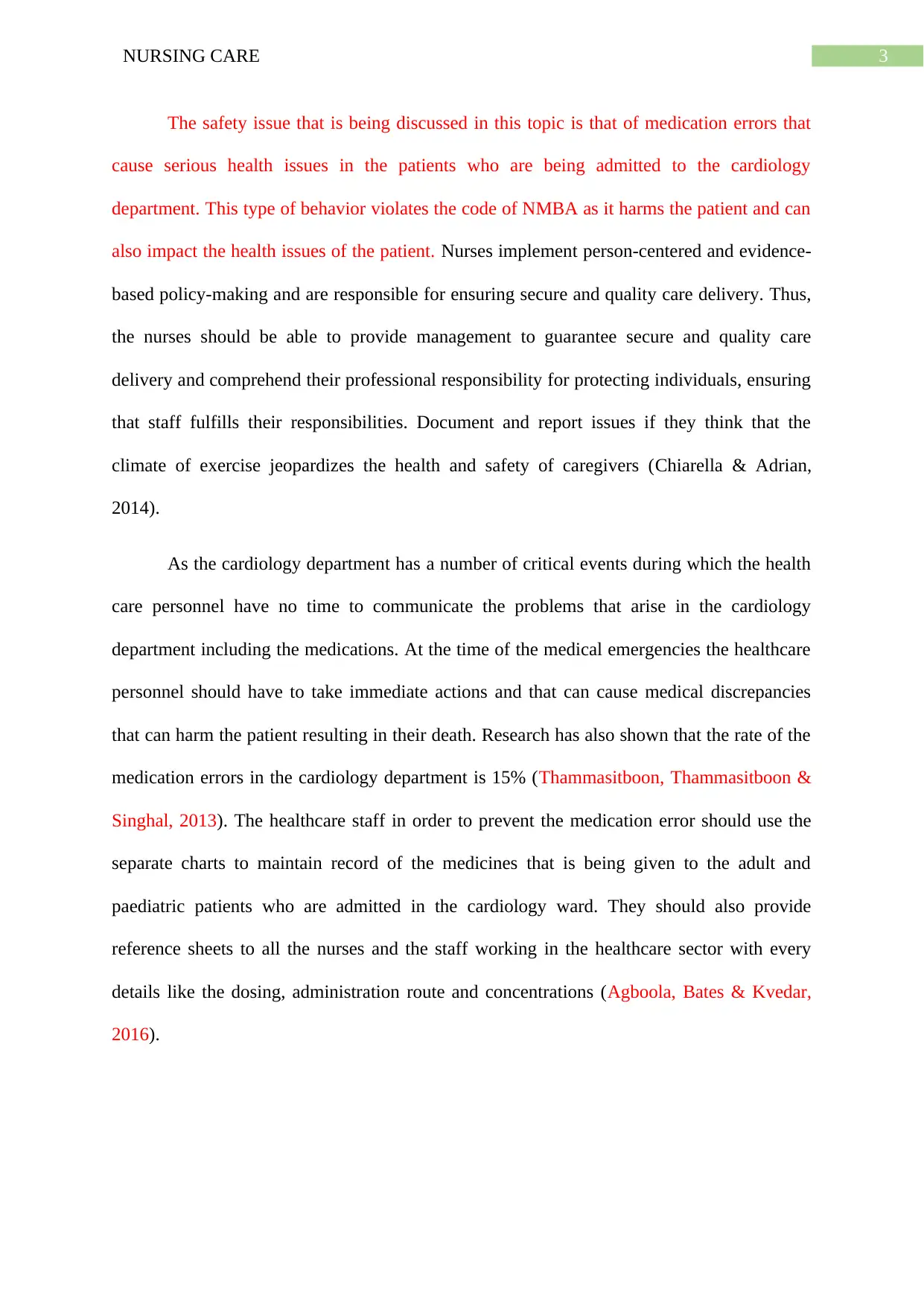
3NURSING CARE
The safety issue that is being discussed in this topic is that of medication errors that
cause serious health issues in the patients who are being admitted to the cardiology
department. This type of behavior violates the code of NMBA as it harms the patient and can
also impact the health issues of the patient. Nurses implement person-centered and evidence-
based policy-making and are responsible for ensuring secure and quality care delivery. Thus,
the nurses should be able to provide management to guarantee secure and quality care
delivery and comprehend their professional responsibility for protecting individuals, ensuring
that staff fulfills their responsibilities. Document and report issues if they think that the
climate of exercise jeopardizes the health and safety of caregivers (Chiarella & Adrian,
2014).
As the cardiology department has a number of critical events during which the health
care personnel have no time to communicate the problems that arise in the cardiology
department including the medications. At the time of the medical emergencies the healthcare
personnel should have to take immediate actions and that can cause medical discrepancies
that can harm the patient resulting in their death. Research has also shown that the rate of the
medication errors in the cardiology department is 15% (Thammasitboon, Thammasitboon &
Singhal, 2013). The healthcare staff in order to prevent the medication error should use the
separate charts to maintain record of the medicines that is being given to the adult and
paediatric patients who are admitted in the cardiology ward. They should also provide
reference sheets to all the nurses and the staff working in the healthcare sector with every
details like the dosing, administration route and concentrations (Agboola, Bates & Kvedar,
2016).
The safety issue that is being discussed in this topic is that of medication errors that
cause serious health issues in the patients who are being admitted to the cardiology
department. This type of behavior violates the code of NMBA as it harms the patient and can
also impact the health issues of the patient. Nurses implement person-centered and evidence-
based policy-making and are responsible for ensuring secure and quality care delivery. Thus,
the nurses should be able to provide management to guarantee secure and quality care
delivery and comprehend their professional responsibility for protecting individuals, ensuring
that staff fulfills their responsibilities. Document and report issues if they think that the
climate of exercise jeopardizes the health and safety of caregivers (Chiarella & Adrian,
2014).
As the cardiology department has a number of critical events during which the health
care personnel have no time to communicate the problems that arise in the cardiology
department including the medications. At the time of the medical emergencies the healthcare
personnel should have to take immediate actions and that can cause medical discrepancies
that can harm the patient resulting in their death. Research has also shown that the rate of the
medication errors in the cardiology department is 15% (Thammasitboon, Thammasitboon &
Singhal, 2013). The healthcare staff in order to prevent the medication error should use the
separate charts to maintain record of the medicines that is being given to the adult and
paediatric patients who are admitted in the cardiology ward. They should also provide
reference sheets to all the nurses and the staff working in the healthcare sector with every
details like the dosing, administration route and concentrations (Agboola, Bates & Kvedar,
2016).
Paraphrase This Document
Need a fresh take? Get an instant paraphrase of this document with our AI Paraphraser
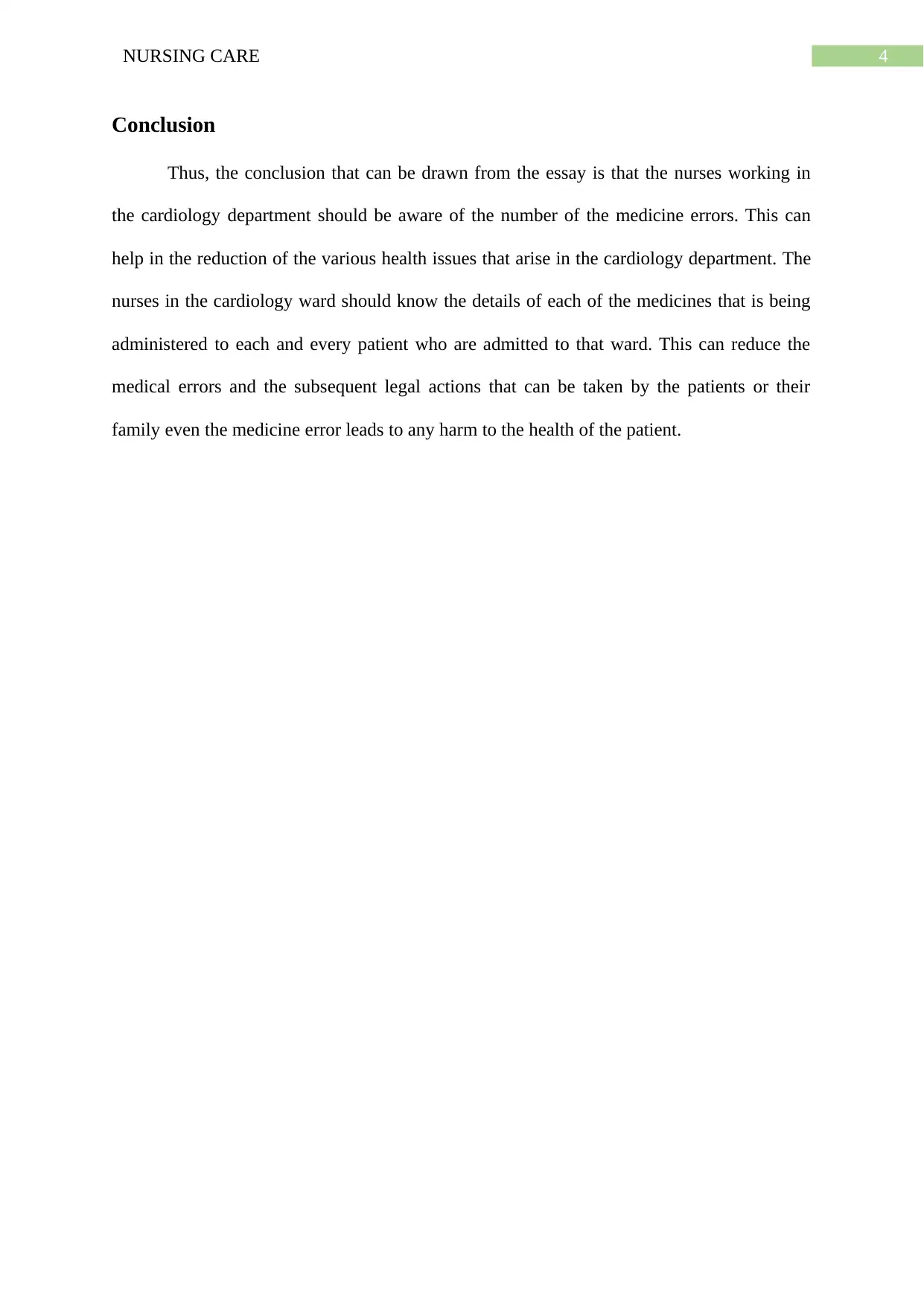
4NURSING CARE
Conclusion
Thus, the conclusion that can be drawn from the essay is that the nurses working in
the cardiology department should be aware of the number of the medicine errors. This can
help in the reduction of the various health issues that arise in the cardiology department. The
nurses in the cardiology ward should know the details of each of the medicines that is being
administered to each and every patient who are admitted to that ward. This can reduce the
medical errors and the subsequent legal actions that can be taken by the patients or their
family even the medicine error leads to any harm to the health of the patient.
Conclusion
Thus, the conclusion that can be drawn from the essay is that the nurses working in
the cardiology department should be aware of the number of the medicine errors. This can
help in the reduction of the various health issues that arise in the cardiology department. The
nurses in the cardiology ward should know the details of each of the medicines that is being
administered to each and every patient who are admitted to that ward. This can reduce the
medical errors and the subsequent legal actions that can be taken by the patients or their
family even the medicine error leads to any harm to the health of the patient.
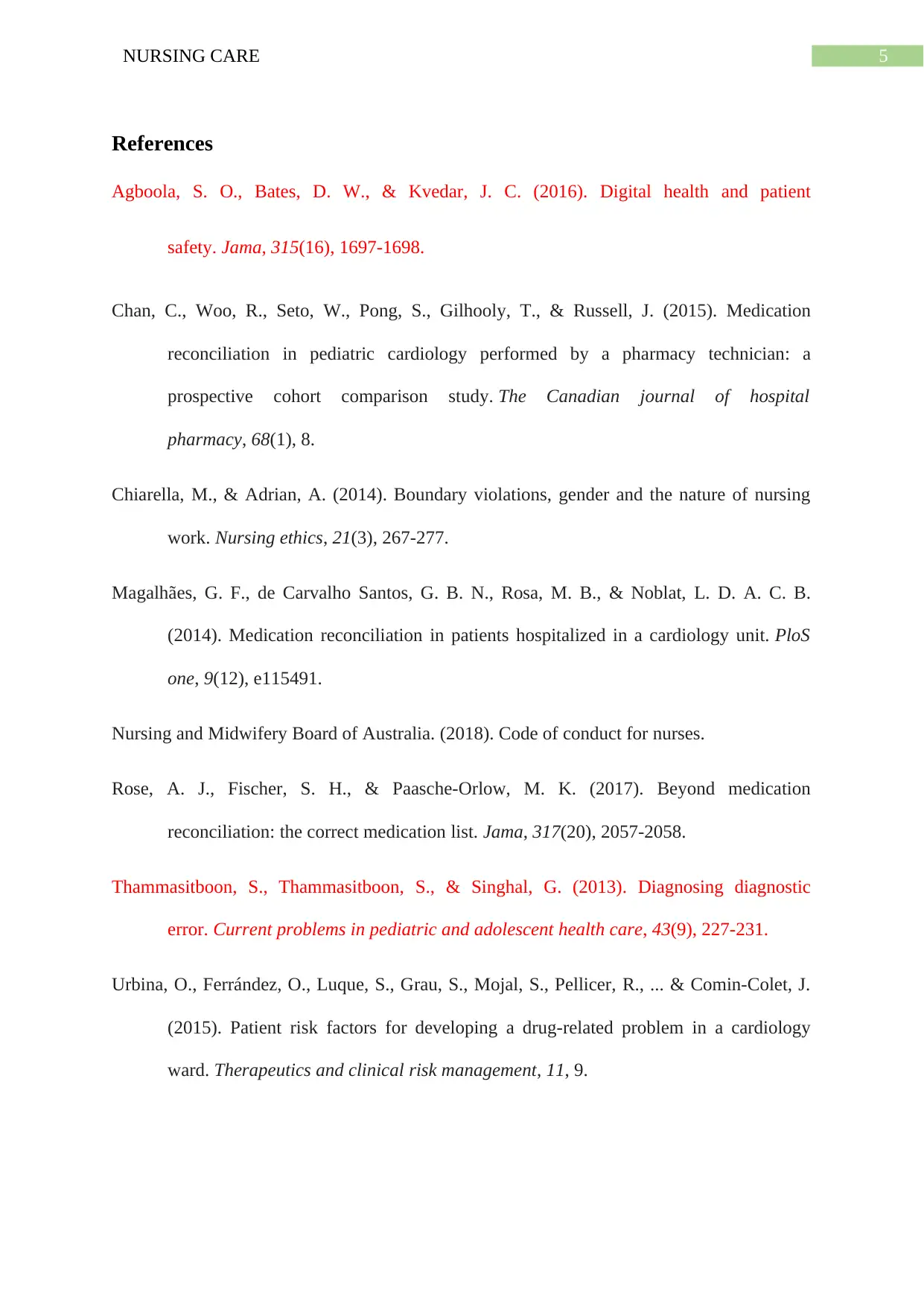
5NURSING CARE
References
Agboola, S. O., Bates, D. W., & Kvedar, J. C. (2016). Digital health and patient
safety. Jama, 315(16), 1697-1698.
Chan, C., Woo, R., Seto, W., Pong, S., Gilhooly, T., & Russell, J. (2015). Medication
reconciliation in pediatric cardiology performed by a pharmacy technician: a
prospective cohort comparison study. The Canadian journal of hospital
pharmacy, 68(1), 8.
Chiarella, M., & Adrian, A. (2014). Boundary violations, gender and the nature of nursing
work. Nursing ethics, 21(3), 267-277.
Magalhães, G. F., de Carvalho Santos, G. B. N., Rosa, M. B., & Noblat, L. D. A. C. B.
(2014). Medication reconciliation in patients hospitalized in a cardiology unit. PloS
one, 9(12), e115491.
Nursing and Midwifery Board of Australia. (2018). Code of conduct for nurses.
Rose, A. J., Fischer, S. H., & Paasche-Orlow, M. K. (2017). Beyond medication
reconciliation: the correct medication list. Jama, 317(20), 2057-2058.
Thammasitboon, S., Thammasitboon, S., & Singhal, G. (2013). Diagnosing diagnostic
error. Current problems in pediatric and adolescent health care, 43(9), 227-231.
Urbina, O., Ferrández, O., Luque, S., Grau, S., Mojal, S., Pellicer, R., ... & Comin-Colet, J.
(2015). Patient risk factors for developing a drug-related problem in a cardiology
ward. Therapeutics and clinical risk management, 11, 9.
References
Agboola, S. O., Bates, D. W., & Kvedar, J. C. (2016). Digital health and patient
safety. Jama, 315(16), 1697-1698.
Chan, C., Woo, R., Seto, W., Pong, S., Gilhooly, T., & Russell, J. (2015). Medication
reconciliation in pediatric cardiology performed by a pharmacy technician: a
prospective cohort comparison study. The Canadian journal of hospital
pharmacy, 68(1), 8.
Chiarella, M., & Adrian, A. (2014). Boundary violations, gender and the nature of nursing
work. Nursing ethics, 21(3), 267-277.
Magalhães, G. F., de Carvalho Santos, G. B. N., Rosa, M. B., & Noblat, L. D. A. C. B.
(2014). Medication reconciliation in patients hospitalized in a cardiology unit. PloS
one, 9(12), e115491.
Nursing and Midwifery Board of Australia. (2018). Code of conduct for nurses.
Rose, A. J., Fischer, S. H., & Paasche-Orlow, M. K. (2017). Beyond medication
reconciliation: the correct medication list. Jama, 317(20), 2057-2058.
Thammasitboon, S., Thammasitboon, S., & Singhal, G. (2013). Diagnosing diagnostic
error. Current problems in pediatric and adolescent health care, 43(9), 227-231.
Urbina, O., Ferrández, O., Luque, S., Grau, S., Mojal, S., Pellicer, R., ... & Comin-Colet, J.
(2015). Patient risk factors for developing a drug-related problem in a cardiology
ward. Therapeutics and clinical risk management, 11, 9.
⊘ This is a preview!⊘
Do you want full access?
Subscribe today to unlock all pages.

Trusted by 1+ million students worldwide
1 out of 6
Related Documents
Your All-in-One AI-Powered Toolkit for Academic Success.
+13062052269
info@desklib.com
Available 24*7 on WhatsApp / Email
![[object Object]](/_next/static/media/star-bottom.7253800d.svg)
Unlock your academic potential
Copyright © 2020–2026 A2Z Services. All Rights Reserved. Developed and managed by ZUCOL.




